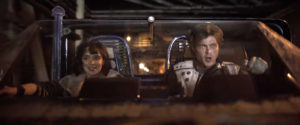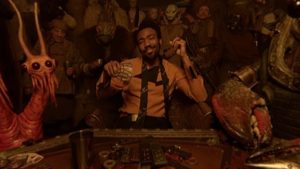Solo: A Star Wars Story (2018)
Alden Ehrenreich, Woody Harrelson, Emilia Clarke, Donald Glover, Thandie Newton, Phoebe Waller-Bridge, Joonas Suotamo, Paul Bettany.
 It’s another standalone Star Wars story, and after Rogue One I have to say I was amped to see it. Alden Ehrenreich is a terrific actor, and his “Would that it were so simple” dialogue with Ralph Fiennes in Hail, Caesar! is one of the most laugh-aloud funny scenes I’ve seen in years, so nobody needed to persuade me to buy him as Solo. I was already bought.
It’s another standalone Star Wars story, and after Rogue One I have to say I was amped to see it. Alden Ehrenreich is a terrific actor, and his “Would that it were so simple” dialogue with Ralph Fiennes in Hail, Caesar! is one of the most laugh-aloud funny scenes I’ve seen in years, so nobody needed to persuade me to buy him as Solo. I was already bought.
 Solo: A Star Wars Story traces Han Solo’s early life, beginning with an escape from some kind of child labor camp (or something!) and ending somewhere vaguely familiar but nonspecific in our knowledge of the Star Wars universe. As it unfolds, we see the development of Han’s story in the years before we meet him in Episode IV.
Solo: A Star Wars Story traces Han Solo’s early life, beginning with an escape from some kind of child labor camp (or something!) and ending somewhere vaguely familiar but nonspecific in our knowledge of the Star Wars universe. As it unfolds, we see the development of Han’s story in the years before we meet him in Episode IV.
 It’s a standalone movie, but of course it’s a standalone movie about a beloved character. The writers, actors, and director have to walk a delicate line between just telling a good story and being true to both canon and spirit, and they walk it well. Although some of my female friends disagree, Ehrenreich has the swagger and cunning of the Han Solo we know. If he’s not as ruggedly handsome or seductive, he shows signs of becoming that guy. We should expect him to be a bit raw and even innocent, two words we’d never use in describing the character as played by Harrison Ford. Young Han Solo has seen things, but not that many things.
It’s a standalone movie, but of course it’s a standalone movie about a beloved character. The writers, actors, and director have to walk a delicate line between just telling a good story and being true to both canon and spirit, and they walk it well. Although some of my female friends disagree, Ehrenreich has the swagger and cunning of the Han Solo we know. If he’s not as ruggedly handsome or seductive, he shows signs of becoming that guy. We should expect him to be a bit raw and even innocent, two words we’d never use in describing the character as played by Harrison Ford. Young Han Solo has seen things, but not that many things.
 The other major, less doubtful question is whether Donald Glover could pull off Lando Calrissian. I feel very confident in assessing his performance as better than anyone could have hoped. He’s not only perfect, he’s somehow better than that, so charismatic, morally ambiguous, and charming that he almost steals the movie from Ehrenreich.
The other major, less doubtful question is whether Donald Glover could pull off Lando Calrissian. I feel very confident in assessing his performance as better than anyone could have hoped. He’s not only perfect, he’s somehow better than that, so charismatic, morally ambiguous, and charming that he almost steals the movie from Ehrenreich.
Add Woody Harrelson, a new droid named L3-37, a love interest named Qi’ra, and of course Chewbacca, and you have a solid cast for what should be the first movie in a trilogy. Honestly, it’s a stronger set of actors than we thought we had after episodes IV, I, or VII, and if the story is not quite as good as some of the best in the series, it can be excused for spending more time on character development than plot.
This is not to suggest the plot is terrible. It’s decent space western stuff with unanswered questions enough to keep the audience guessing as it awaits word on a sequel. I found enough to chew on that I waited only a week before getting back to the theater to see it again. I’m fully down with this Solo, this Calrissian, and this nested series. I’ve got a good feeling about this.
8/10
81/100

 I admired Destin Daniel Cretton’s Short Term 12, largely for its character-driven approach, realistic portrayal of life in a juvenile care home, and excellent acting by Brie Larson. Something about the director’s style appeals to me, and I’ve since become an even greater admirer of Larson, who won a Best Actress Oscar for her excellent performance in Room.
I admired Destin Daniel Cretton’s Short Term 12, largely for its character-driven approach, realistic portrayal of life in a juvenile care home, and excellent acting by Brie Larson. Something about the director’s style appeals to me, and I’ve since become an even greater admirer of Larson, who won a Best Actress Oscar for her excellent performance in Room. More than anything, Rex Walls (Woody Harrelson) cherishes his freedom. While he’s more than capable of earning an honest living, he and his wife Rose Mary (Naomi Watts) love being able to get into a car and go anywhere, whenever they want, and set up temporary homes wherever they can find some space. Sure, these moves are often spurred by mounting debts the family has no hope of repaying, but they do a good job of communicating to their kids that as long as they have the stars at night, each other all the time, and freedom from obligations, they’re pretty wealthy.
More than anything, Rex Walls (Woody Harrelson) cherishes his freedom. While he’s more than capable of earning an honest living, he and his wife Rose Mary (Naomi Watts) love being able to get into a car and go anywhere, whenever they want, and set up temporary homes wherever they can find some space. Sure, these moves are often spurred by mounting debts the family has no hope of repaying, but they do a good job of communicating to their kids that as long as they have the stars at night, each other all the time, and freedom from obligations, they’re pretty wealthy. This is really the story of how Jeannette—clearly her father’s favorite, at least as this story is told—grows through stages of relating to and understanding her father. I find it a satisfying arc, although whether you will find it satisfying probably depends on how strongly you condemn Rex. Many critics seem to believe that Rex’s offenses are too great for any kind of redemption, let alone the weakly granted redemption he’s given. Since the film is told through Jeannette’s eyes, I say there’s a place where maybe we don’t feel at all satisfied for Jeannette and her siblings but can accept that they’re satisfied themselves. This is their father, and what good will it do any of them not to forgive?
This is really the story of how Jeannette—clearly her father’s favorite, at least as this story is told—grows through stages of relating to and understanding her father. I find it a satisfying arc, although whether you will find it satisfying probably depends on how strongly you condemn Rex. Many critics seem to believe that Rex’s offenses are too great for any kind of redemption, let alone the weakly granted redemption he’s given. Since the film is told through Jeannette’s eyes, I say there’s a place where maybe we don’t feel at all satisfied for Jeannette and her siblings but can accept that they’re satisfied themselves. This is their father, and what good will it do any of them not to forgive?